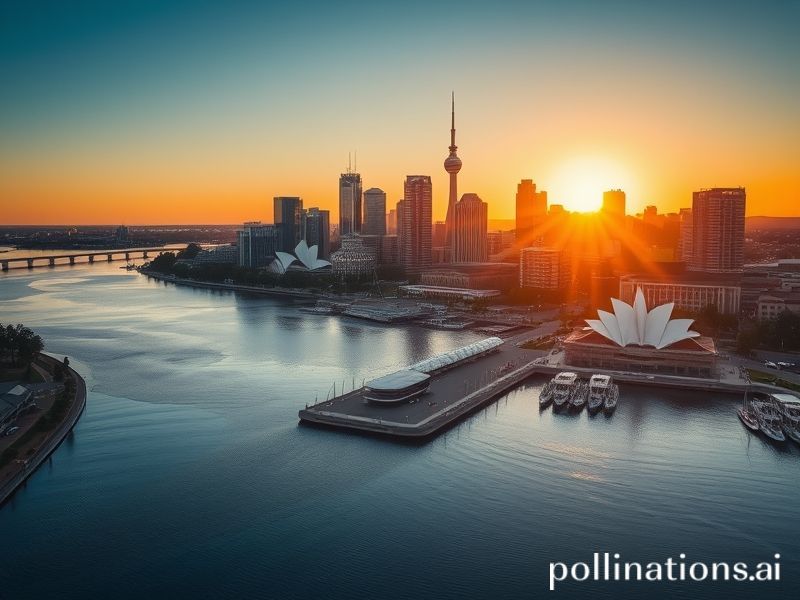Perth on the Brink: How a Remote Australian City Quietly Runs the World’s Battery Habit
Perth—population 2.2 million, give or take a few FIFO* miners who’ve lost track of what day it is—sits alone on the planet’s loneliest edge: closer to Jakarta than to Sydney, closer to the Antarctic research station’s lonely beer fridge than to Canberra’s warmer political ambitions. To the rest of the world, Western Australia’s capital is less a city than a thought experiment: what happens when you drop a perfectly serviceable metropolis at the precise point where Google Maps shrugs and says, “Good luck, mate.”
Global investors, bless their quarterly-report hearts, have noticed. Perth now exports more than existential dread; it ships half the lithium that will eventually power your next virtue-signalling electric SUV. The price of that soft, silvery metal swings harder than a hedge fund manager’s mood on bonus day, and every tremor reverberates from Shenzhen battery plants to Bavarian boardrooms. In other words, when a Perth geologist sneezes, Elon Musk catches a head cold.
Meanwhile, the Indian Ocean laps at the city’s immaculate beaches with the patience of a creditor who already knows you’re good for the money. Climate change, that unwanted houseguest, has nudged sea levels up just enough to make coastal real-estate agents practice their sincere-yet-vague euphemisms: “Water-adjacent lifestyle opportunity.” The insurance industry, never famous for its sense of humour, has responded with premiums that read like ransom notes. If irony had a postcode, it would be 6000.
Multiculturalism, Australia’s official hobby, is thriving in the sun. Walk through Northbridge on a Friday night and you’ll hear Mandarin, Tagalog, and Irish brogues competing with the universal language of overpriced cocktails. Somewhere in the crowd a British backpacker is explaining to a bewildered French tourist that yes, tipping is optional, “but only if you enjoy being silently judged.” Humanity: same firmware, different accents.
Yet Perth’s greatest export may be psychological. The city’s five-hour flight from anywhere important has become a selling point in the age of remote work. Tech refugees fleeing San Francisco rents and London drizzle arrive clutching MacBooks and unresolved trauma, delighted to discover that lunch breaks can legally include dolphins. They tweet breathlessly about “work-life balance,” blissfully unaware that the phrase itself died of exhaustion sometime around 2017. Still, the Wi-Fi is decent and the coffee roasters speak in tasting notes that would shame a sommelier, so the illusion holds.
Politically, Perth functions as Australia’s control group: a vast, resource-rich sandbox where policies are beta-tested before being inflicted on the more densely populated east. When the state government recently floated the idea of seceding—again—the international press corps barely looked up from whatever fresh apocalypse was trending. After all, if Texas threatens to leave every fiscal quarter, why shouldn’t Western Australia have a turn? The difference, of course, is that Texas doesn’t supply 40 percent of the world’s iron ore. If Perth ever did slam the door on its way out, the global steel market would develop a nervous twitch strong enough to register on the Richter scale.
And so the city endures, equal parts boomtown and open-air therapy session, mining the future while trying to remember where it parked the present. Somewhere offshore, Chinese bulk carriers queue like polite shoppers at an existential Costco, waiting to ferry red dirt back to smelters that will forge the bones of tomorrow’s megacities. Back on land, construction cranes bow to one another in the wind, a mechanical ballet choreographed by commodity prices and pure, uncut optimism.
Perth, then, is not merely a dot on the Indian Ocean rim. It is the planet’s provisional capital of “for now”: for now the lithium lasts, for now the beaches remain unsalted by permanent inundation, for now the illusion of distance protects it from the worst of the world’s self-inflicted chaos. Enjoy the sunset, order another A$22 negroni, and remember that somewhere out there, a spreadsheet in Zurich is quietly deciding whether you get to keep the view.
*Fly-In-Fly-Out, the mining industry’s answer to long-distance relationships.







